Ethical Storytelling on Social Media | Task Report
VerifiedAdded on 2022/08/25
|9
|1991
|18
AI Summary
Contribute Materials
Your contribution can guide someone’s learning journey. Share your
documents today.
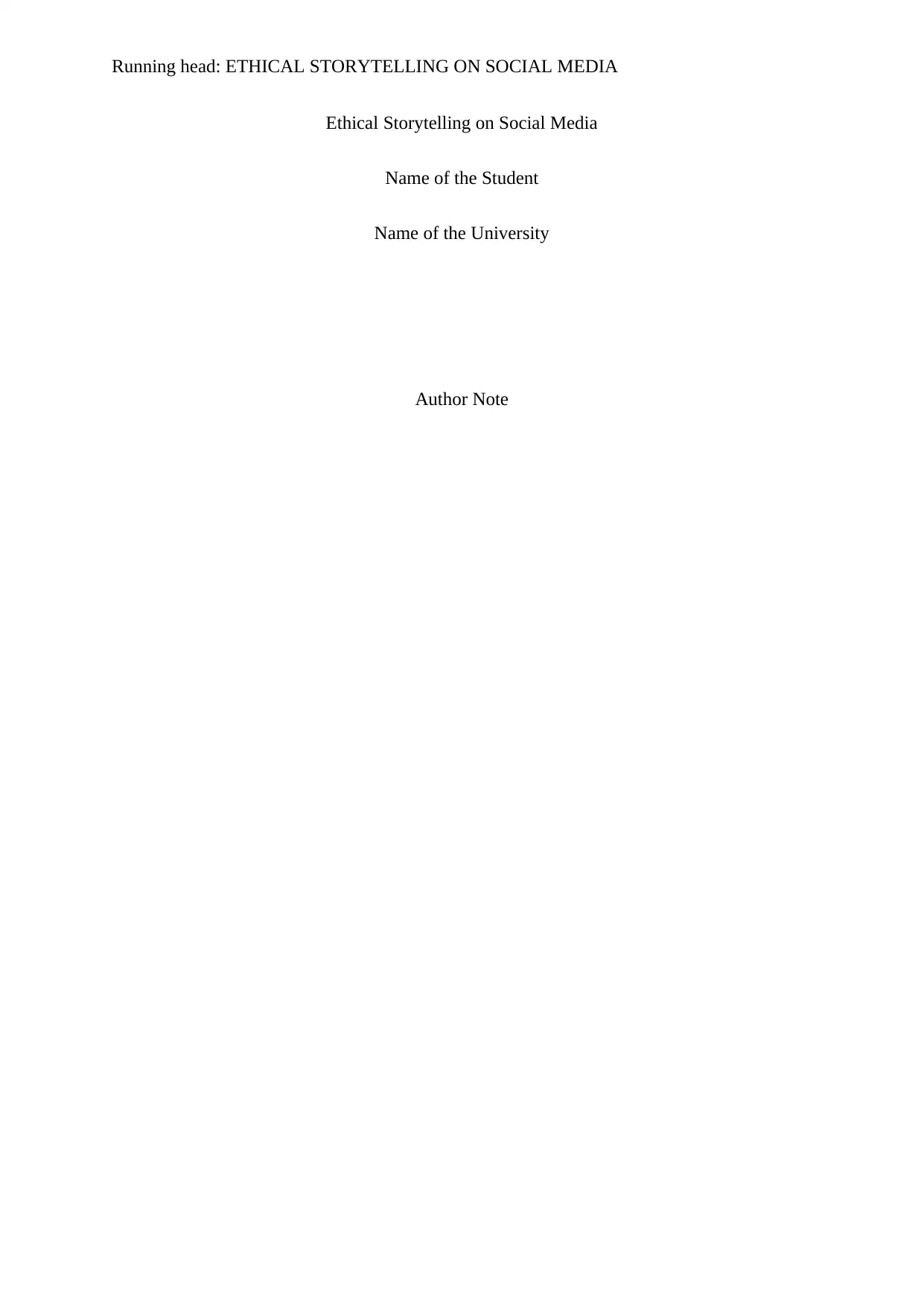
Running head: ETHICAL STORYTELLING ON SOCIAL MEDIA
Ethical Storytelling on Social Media
Name of the Student
Name of the University
Author Note
Ethical Storytelling on Social Media
Name of the Student
Name of the University
Author Note
Secure Best Marks with AI Grader
Need help grading? Try our AI Grader for instant feedback on your assignments.
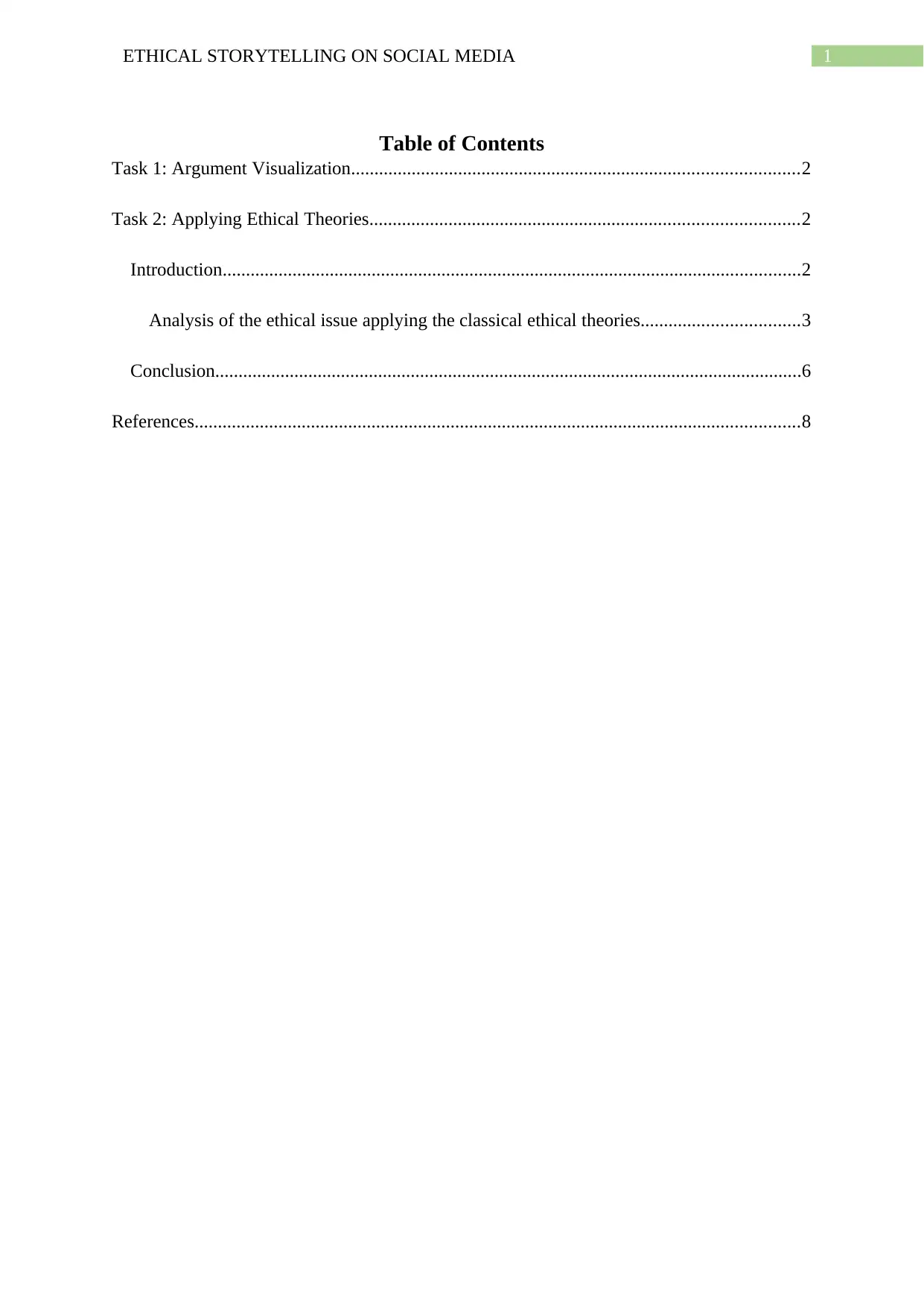
1ETHICAL STORYTELLING ON SOCIAL MEDIA
Table of Contents
Task 1: Argument Visualization................................................................................................2
Task 2: Applying Ethical Theories............................................................................................2
Introduction............................................................................................................................2
Analysis of the ethical issue applying the classical ethical theories..................................3
Conclusion..............................................................................................................................6
References..................................................................................................................................8
Table of Contents
Task 1: Argument Visualization................................................................................................2
Task 2: Applying Ethical Theories............................................................................................2
Introduction............................................................................................................................2
Analysis of the ethical issue applying the classical ethical theories..................................3
Conclusion..............................................................................................................................6
References..................................................................................................................................8
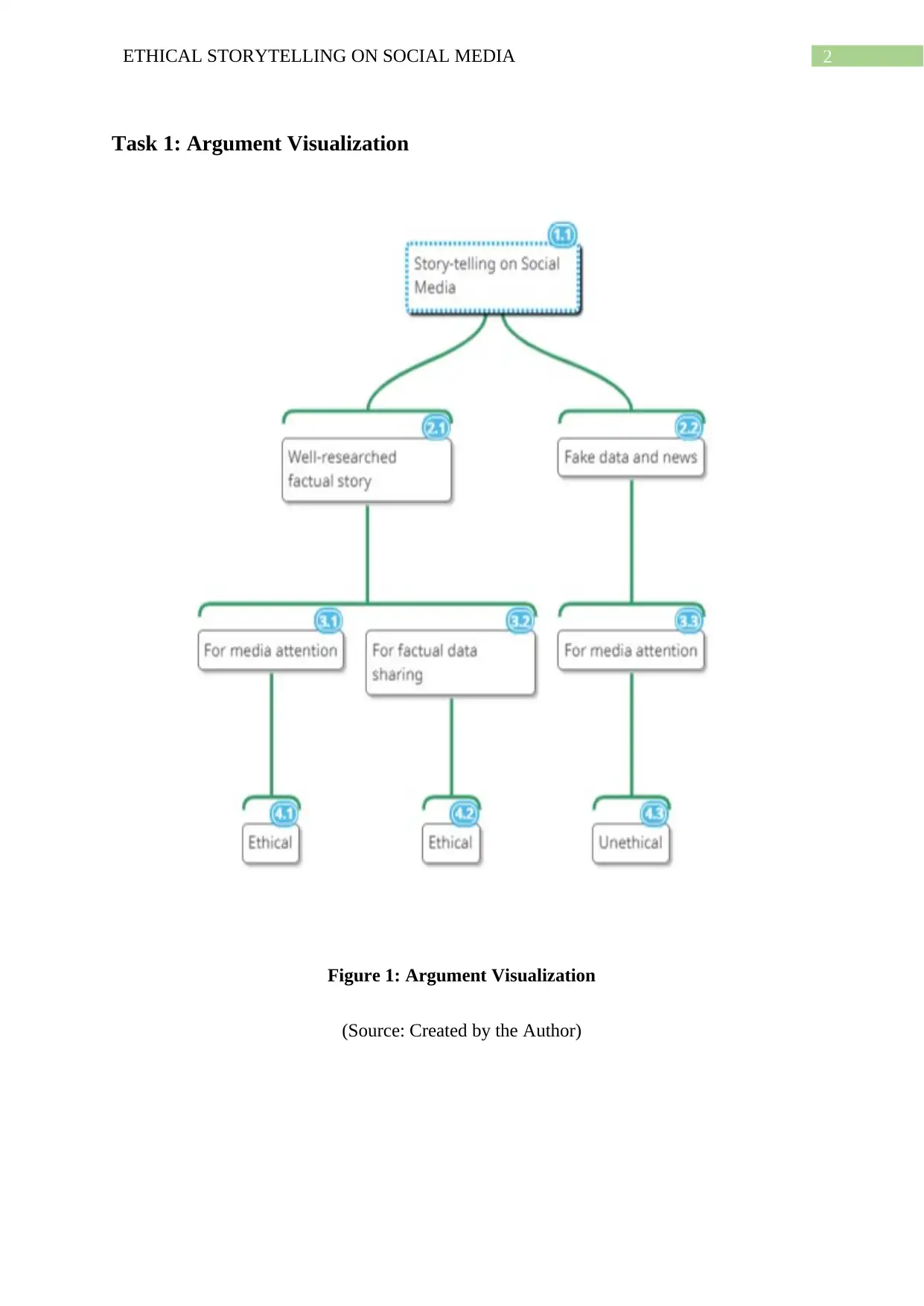
2ETHICAL STORYTELLING ON SOCIAL MEDIA
Task 1: Argument Visualization
Figure 1: Argument Visualization
(Source: Created by the Author)
Task 1: Argument Visualization
Figure 1: Argument Visualization
(Source: Created by the Author)
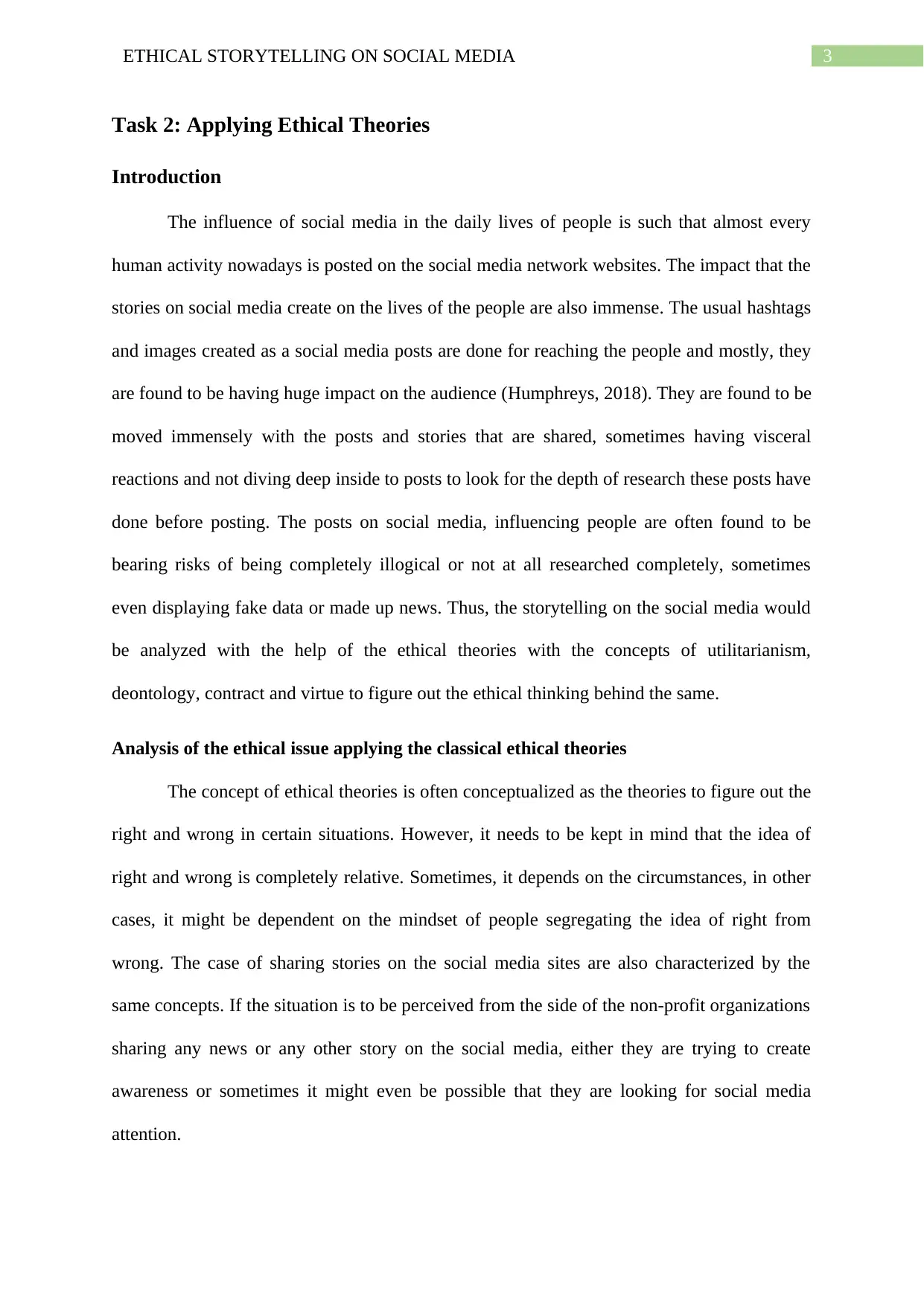
3ETHICAL STORYTELLING ON SOCIAL MEDIA
Task 2: Applying Ethical Theories
Introduction
The influence of social media in the daily lives of people is such that almost every
human activity nowadays is posted on the social media network websites. The impact that the
stories on social media create on the lives of the people are also immense. The usual hashtags
and images created as a social media posts are done for reaching the people and mostly, they
are found to be having huge impact on the audience (Humphreys, 2018). They are found to be
moved immensely with the posts and stories that are shared, sometimes having visceral
reactions and not diving deep inside to posts to look for the depth of research these posts have
done before posting. The posts on social media, influencing people are often found to be
bearing risks of being completely illogical or not at all researched completely, sometimes
even displaying fake data or made up news. Thus, the storytelling on the social media would
be analyzed with the help of the ethical theories with the concepts of utilitarianism,
deontology, contract and virtue to figure out the ethical thinking behind the same.
Analysis of the ethical issue applying the classical ethical theories
The concept of ethical theories is often conceptualized as the theories to figure out the
right and wrong in certain situations. However, it needs to be kept in mind that the idea of
right and wrong is completely relative. Sometimes, it depends on the circumstances, in other
cases, it might be dependent on the mindset of people segregating the idea of right from
wrong. The case of sharing stories on the social media sites are also characterized by the
same concepts. If the situation is to be perceived from the side of the non-profit organizations
sharing any news or any other story on the social media, either they are trying to create
awareness or sometimes it might even be possible that they are looking for social media
attention.
Task 2: Applying Ethical Theories
Introduction
The influence of social media in the daily lives of people is such that almost every
human activity nowadays is posted on the social media network websites. The impact that the
stories on social media create on the lives of the people are also immense. The usual hashtags
and images created as a social media posts are done for reaching the people and mostly, they
are found to be having huge impact on the audience (Humphreys, 2018). They are found to be
moved immensely with the posts and stories that are shared, sometimes having visceral
reactions and not diving deep inside to posts to look for the depth of research these posts have
done before posting. The posts on social media, influencing people are often found to be
bearing risks of being completely illogical or not at all researched completely, sometimes
even displaying fake data or made up news. Thus, the storytelling on the social media would
be analyzed with the help of the ethical theories with the concepts of utilitarianism,
deontology, contract and virtue to figure out the ethical thinking behind the same.
Analysis of the ethical issue applying the classical ethical theories
The concept of ethical theories is often conceptualized as the theories to figure out the
right and wrong in certain situations. However, it needs to be kept in mind that the idea of
right and wrong is completely relative. Sometimes, it depends on the circumstances, in other
cases, it might be dependent on the mindset of people segregating the idea of right from
wrong. The case of sharing stories on the social media sites are also characterized by the
same concepts. If the situation is to be perceived from the side of the non-profit organizations
sharing any news or any other story on the social media, either they are trying to create
awareness or sometimes it might even be possible that they are looking for social media
attention.
Secure Best Marks with AI Grader
Need help grading? Try our AI Grader for instant feedback on your assignments.
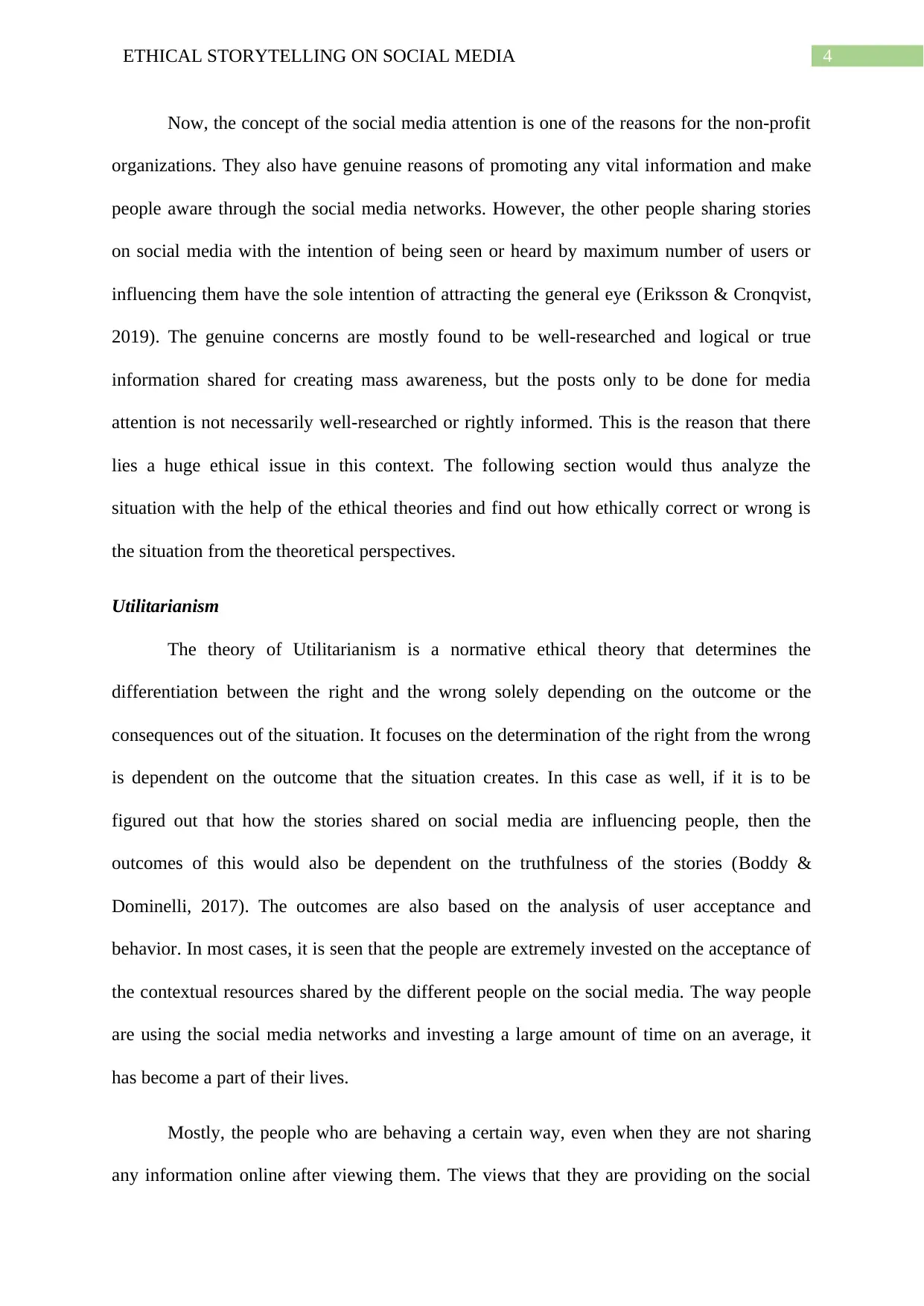
4ETHICAL STORYTELLING ON SOCIAL MEDIA
Now, the concept of the social media attention is one of the reasons for the non-profit
organizations. They also have genuine reasons of promoting any vital information and make
people aware through the social media networks. However, the other people sharing stories
on social media with the intention of being seen or heard by maximum number of users or
influencing them have the sole intention of attracting the general eye (Eriksson & Cronqvist,
2019). The genuine concerns are mostly found to be well-researched and logical or true
information shared for creating mass awareness, but the posts only to be done for media
attention is not necessarily well-researched or rightly informed. This is the reason that there
lies a huge ethical issue in this context. The following section would thus analyze the
situation with the help of the ethical theories and find out how ethically correct or wrong is
the situation from the theoretical perspectives.
Utilitarianism
The theory of Utilitarianism is a normative ethical theory that determines the
differentiation between the right and the wrong solely depending on the outcome or the
consequences out of the situation. It focuses on the determination of the right from the wrong
is dependent on the outcome that the situation creates. In this case as well, if it is to be
figured out that how the stories shared on social media are influencing people, then the
outcomes of this would also be dependent on the truthfulness of the stories (Boddy &
Dominelli, 2017). The outcomes are also based on the analysis of user acceptance and
behavior. In most cases, it is seen that the people are extremely invested on the acceptance of
the contextual resources shared by the different people on the social media. The way people
are using the social media networks and investing a large amount of time on an average, it
has become a part of their lives.
Mostly, the people who are behaving a certain way, even when they are not sharing
any information online after viewing them. The views that they are providing on the social
Now, the concept of the social media attention is one of the reasons for the non-profit
organizations. They also have genuine reasons of promoting any vital information and make
people aware through the social media networks. However, the other people sharing stories
on social media with the intention of being seen or heard by maximum number of users or
influencing them have the sole intention of attracting the general eye (Eriksson & Cronqvist,
2019). The genuine concerns are mostly found to be well-researched and logical or true
information shared for creating mass awareness, but the posts only to be done for media
attention is not necessarily well-researched or rightly informed. This is the reason that there
lies a huge ethical issue in this context. The following section would thus analyze the
situation with the help of the ethical theories and find out how ethically correct or wrong is
the situation from the theoretical perspectives.
Utilitarianism
The theory of Utilitarianism is a normative ethical theory that determines the
differentiation between the right and the wrong solely depending on the outcome or the
consequences out of the situation. It focuses on the determination of the right from the wrong
is dependent on the outcome that the situation creates. In this case as well, if it is to be
figured out that how the stories shared on social media are influencing people, then the
outcomes of this would also be dependent on the truthfulness of the stories (Boddy &
Dominelli, 2017). The outcomes are also based on the analysis of user acceptance and
behavior. In most cases, it is seen that the people are extremely invested on the acceptance of
the contextual resources shared by the different people on the social media. The way people
are using the social media networks and investing a large amount of time on an average, it
has become a part of their lives.
Mostly, the people who are behaving a certain way, even when they are not sharing
any information online after viewing them. The views that they are providing on the social
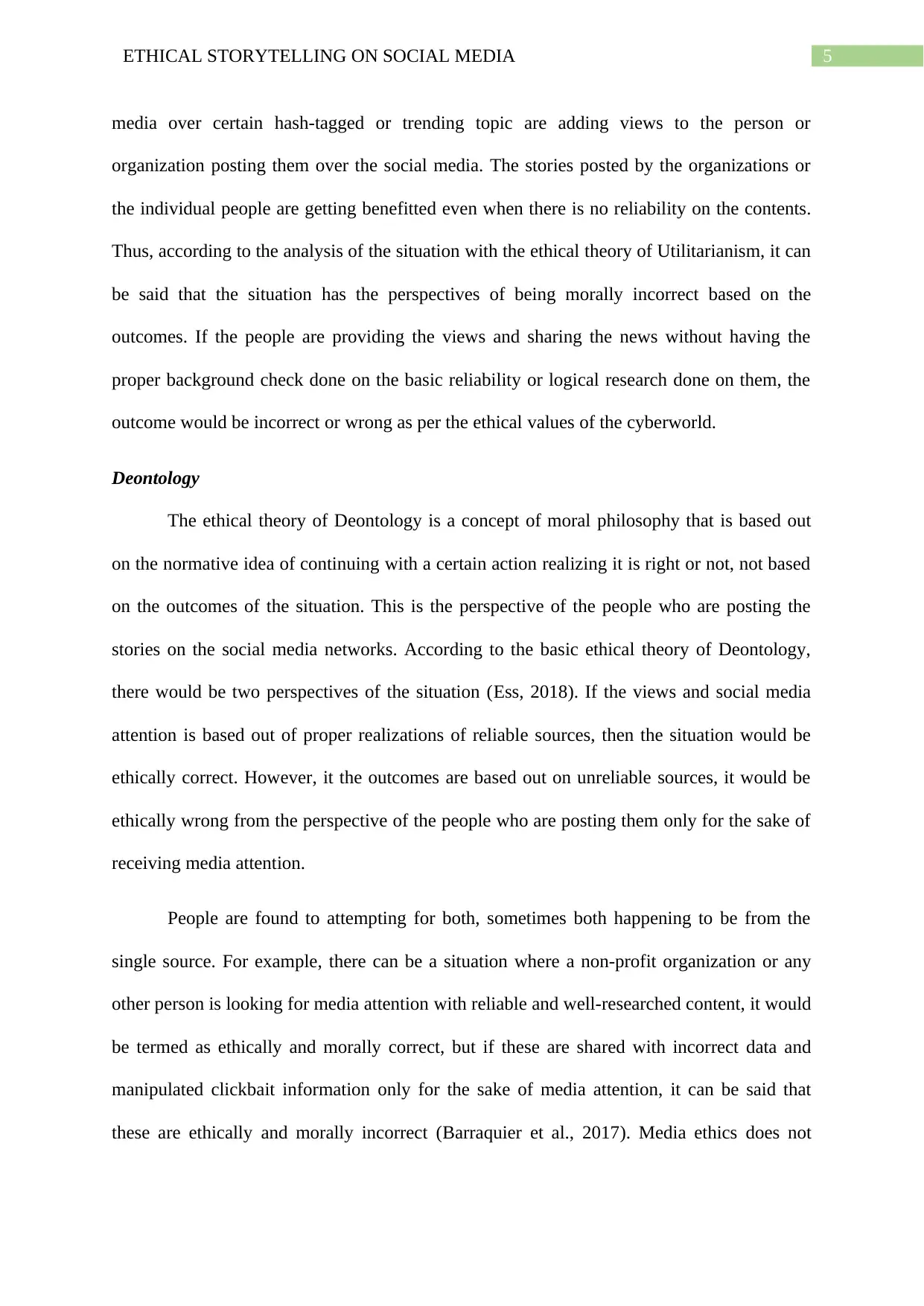
5ETHICAL STORYTELLING ON SOCIAL MEDIA
media over certain hash-tagged or trending topic are adding views to the person or
organization posting them over the social media. The stories posted by the organizations or
the individual people are getting benefitted even when there is no reliability on the contents.
Thus, according to the analysis of the situation with the ethical theory of Utilitarianism, it can
be said that the situation has the perspectives of being morally incorrect based on the
outcomes. If the people are providing the views and sharing the news without having the
proper background check done on the basic reliability or logical research done on them, the
outcome would be incorrect or wrong as per the ethical values of the cyberworld.
Deontology
The ethical theory of Deontology is a concept of moral philosophy that is based out
on the normative idea of continuing with a certain action realizing it is right or not, not based
on the outcomes of the situation. This is the perspective of the people who are posting the
stories on the social media networks. According to the basic ethical theory of Deontology,
there would be two perspectives of the situation (Ess, 2018). If the views and social media
attention is based out of proper realizations of reliable sources, then the situation would be
ethically correct. However, it the outcomes are based out on unreliable sources, it would be
ethically wrong from the perspective of the people who are posting them only for the sake of
receiving media attention.
People are found to attempting for both, sometimes both happening to be from the
single source. For example, there can be a situation where a non-profit organization or any
other person is looking for media attention with reliable and well-researched content, it would
be termed as ethically and morally correct, but if these are shared with incorrect data and
manipulated clickbait information only for the sake of media attention, it can be said that
these are ethically and morally incorrect (Barraquier et al., 2017). Media ethics does not
media over certain hash-tagged or trending topic are adding views to the person or
organization posting them over the social media. The stories posted by the organizations or
the individual people are getting benefitted even when there is no reliability on the contents.
Thus, according to the analysis of the situation with the ethical theory of Utilitarianism, it can
be said that the situation has the perspectives of being morally incorrect based on the
outcomes. If the people are providing the views and sharing the news without having the
proper background check done on the basic reliability or logical research done on them, the
outcome would be incorrect or wrong as per the ethical values of the cyberworld.
Deontology
The ethical theory of Deontology is a concept of moral philosophy that is based out
on the normative idea of continuing with a certain action realizing it is right or not, not based
on the outcomes of the situation. This is the perspective of the people who are posting the
stories on the social media networks. According to the basic ethical theory of Deontology,
there would be two perspectives of the situation (Ess, 2018). If the views and social media
attention is based out of proper realizations of reliable sources, then the situation would be
ethically correct. However, it the outcomes are based out on unreliable sources, it would be
ethically wrong from the perspective of the people who are posting them only for the sake of
receiving media attention.
People are found to attempting for both, sometimes both happening to be from the
single source. For example, there can be a situation where a non-profit organization or any
other person is looking for media attention with reliable and well-researched content, it would
be termed as ethically and morally correct, but if these are shared with incorrect data and
manipulated clickbait information only for the sake of media attention, it can be said that
these are ethically and morally incorrect (Barraquier et al., 2017). Media ethics does not
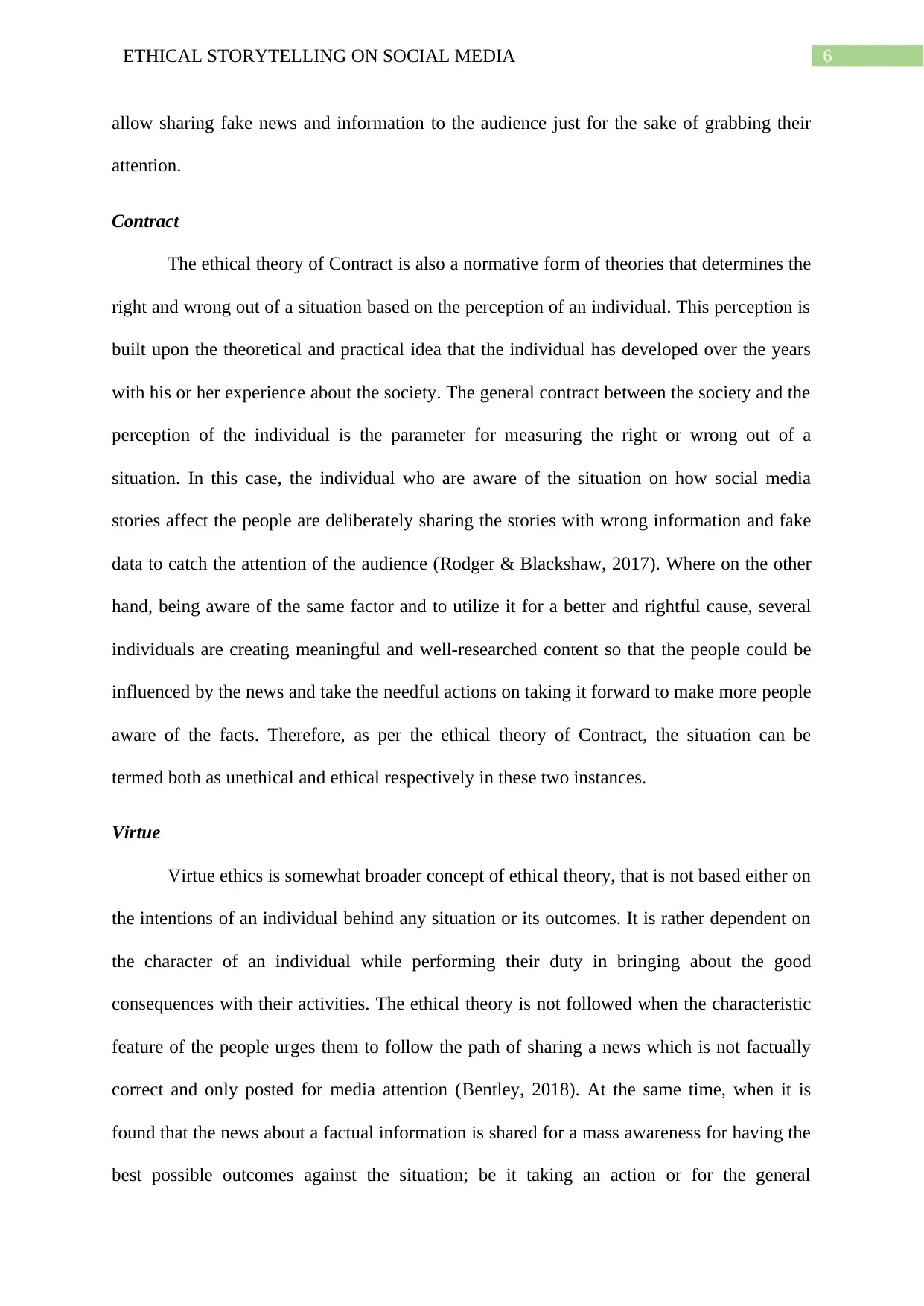
6ETHICAL STORYTELLING ON SOCIAL MEDIA
allow sharing fake news and information to the audience just for the sake of grabbing their
attention.
Contract
The ethical theory of Contract is also a normative form of theories that determines the
right and wrong out of a situation based on the perception of an individual. This perception is
built upon the theoretical and practical idea that the individual has developed over the years
with his or her experience about the society. The general contract between the society and the
perception of the individual is the parameter for measuring the right or wrong out of a
situation. In this case, the individual who are aware of the situation on how social media
stories affect the people are deliberately sharing the stories with wrong information and fake
data to catch the attention of the audience (Rodger & Blackshaw, 2017). Where on the other
hand, being aware of the same factor and to utilize it for a better and rightful cause, several
individuals are creating meaningful and well-researched content so that the people could be
influenced by the news and take the needful actions on taking it forward to make more people
aware of the facts. Therefore, as per the ethical theory of Contract, the situation can be
termed both as unethical and ethical respectively in these two instances.
Virtue
Virtue ethics is somewhat broader concept of ethical theory, that is not based either on
the intentions of an individual behind any situation or its outcomes. It is rather dependent on
the character of an individual while performing their duty in bringing about the good
consequences with their activities. The ethical theory is not followed when the characteristic
feature of the people urges them to follow the path of sharing a news which is not factually
correct and only posted for media attention (Bentley, 2018). At the same time, when it is
found that the news about a factual information is shared for a mass awareness for having the
best possible outcomes against the situation; be it taking an action or for the general
allow sharing fake news and information to the audience just for the sake of grabbing their
attention.
Contract
The ethical theory of Contract is also a normative form of theories that determines the
right and wrong out of a situation based on the perception of an individual. This perception is
built upon the theoretical and practical idea that the individual has developed over the years
with his or her experience about the society. The general contract between the society and the
perception of the individual is the parameter for measuring the right or wrong out of a
situation. In this case, the individual who are aware of the situation on how social media
stories affect the people are deliberately sharing the stories with wrong information and fake
data to catch the attention of the audience (Rodger & Blackshaw, 2017). Where on the other
hand, being aware of the same factor and to utilize it for a better and rightful cause, several
individuals are creating meaningful and well-researched content so that the people could be
influenced by the news and take the needful actions on taking it forward to make more people
aware of the facts. Therefore, as per the ethical theory of Contract, the situation can be
termed both as unethical and ethical respectively in these two instances.
Virtue
Virtue ethics is somewhat broader concept of ethical theory, that is not based either on
the intentions of an individual behind any situation or its outcomes. It is rather dependent on
the character of an individual while performing their duty in bringing about the good
consequences with their activities. The ethical theory is not followed when the characteristic
feature of the people urges them to follow the path of sharing a news which is not factually
correct and only posted for media attention (Bentley, 2018). At the same time, when it is
found that the news about a factual information is shared for a mass awareness for having the
best possible outcomes against the situation; be it taking an action or for the general
Paraphrase This Document
Need a fresh take? Get an instant paraphrase of this document with our AI Paraphraser
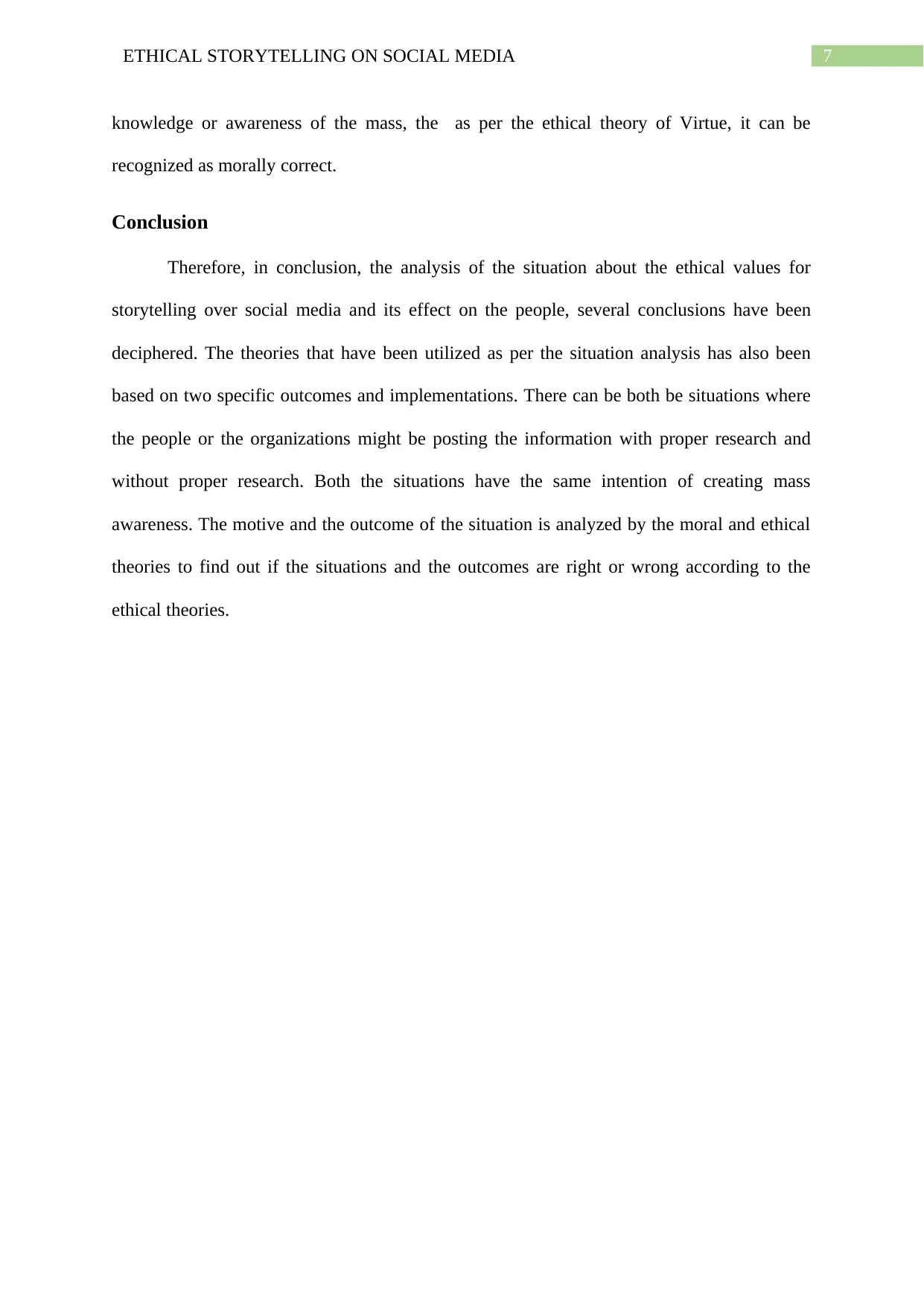
7ETHICAL STORYTELLING ON SOCIAL MEDIA
knowledge or awareness of the mass, the as per the ethical theory of Virtue, it can be
recognized as morally correct.
Conclusion
Therefore, in conclusion, the analysis of the situation about the ethical values for
storytelling over social media and its effect on the people, several conclusions have been
deciphered. The theories that have been utilized as per the situation analysis has also been
based on two specific outcomes and implementations. There can be both be situations where
the people or the organizations might be posting the information with proper research and
without proper research. Both the situations have the same intention of creating mass
awareness. The motive and the outcome of the situation is analyzed by the moral and ethical
theories to find out if the situations and the outcomes are right or wrong according to the
ethical theories.
knowledge or awareness of the mass, the as per the ethical theory of Virtue, it can be
recognized as morally correct.
Conclusion
Therefore, in conclusion, the analysis of the situation about the ethical values for
storytelling over social media and its effect on the people, several conclusions have been
deciphered. The theories that have been utilized as per the situation analysis has also been
based on two specific outcomes and implementations. There can be both be situations where
the people or the organizations might be posting the information with proper research and
without proper research. Both the situations have the same intention of creating mass
awareness. The motive and the outcome of the situation is analyzed by the moral and ethical
theories to find out if the situations and the outcomes are right or wrong according to the
ethical theories.
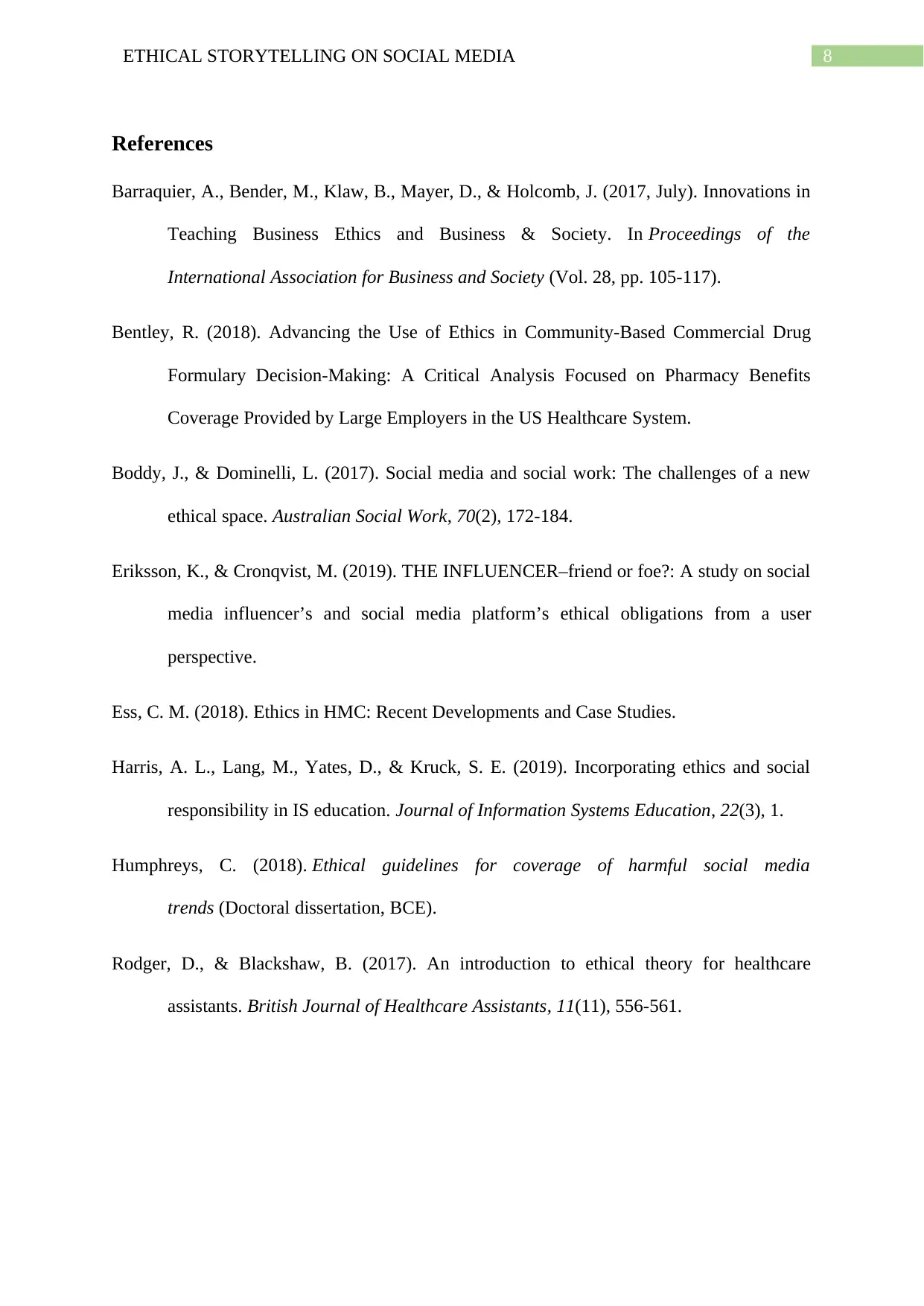
8ETHICAL STORYTELLING ON SOCIAL MEDIA
References
Barraquier, A., Bender, M., Klaw, B., Mayer, D., & Holcomb, J. (2017, July). Innovations in
Teaching Business Ethics and Business & Society. In Proceedings of the
International Association for Business and Society (Vol. 28, pp. 105-117).
Bentley, R. (2018). Advancing the Use of Ethics in Community-Based Commercial Drug
Formulary Decision-Making: A Critical Analysis Focused on Pharmacy Benefits
Coverage Provided by Large Employers in the US Healthcare System.
Boddy, J., & Dominelli, L. (2017). Social media and social work: The challenges of a new
ethical space. Australian Social Work, 70(2), 172-184.
Eriksson, K., & Cronqvist, M. (2019). THE INFLUENCER–friend or foe?: A study on social
media influencer’s and social media platform’s ethical obligations from a user
perspective.
Ess, C. M. (2018). Ethics in HMC: Recent Developments and Case Studies.
Harris, A. L., Lang, M., Yates, D., & Kruck, S. E. (2019). Incorporating ethics and social
responsibility in IS education. Journal of Information Systems Education, 22(3), 1.
Humphreys, C. (2018). Ethical guidelines for coverage of harmful social media
trends (Doctoral dissertation, BCE).
Rodger, D., & Blackshaw, B. (2017). An introduction to ethical theory for healthcare
assistants. British Journal of Healthcare Assistants, 11(11), 556-561.
References
Barraquier, A., Bender, M., Klaw, B., Mayer, D., & Holcomb, J. (2017, July). Innovations in
Teaching Business Ethics and Business & Society. In Proceedings of the
International Association for Business and Society (Vol. 28, pp. 105-117).
Bentley, R. (2018). Advancing the Use of Ethics in Community-Based Commercial Drug
Formulary Decision-Making: A Critical Analysis Focused on Pharmacy Benefits
Coverage Provided by Large Employers in the US Healthcare System.
Boddy, J., & Dominelli, L. (2017). Social media and social work: The challenges of a new
ethical space. Australian Social Work, 70(2), 172-184.
Eriksson, K., & Cronqvist, M. (2019). THE INFLUENCER–friend or foe?: A study on social
media influencer’s and social media platform’s ethical obligations from a user
perspective.
Ess, C. M. (2018). Ethics in HMC: Recent Developments and Case Studies.
Harris, A. L., Lang, M., Yates, D., & Kruck, S. E. (2019). Incorporating ethics and social
responsibility in IS education. Journal of Information Systems Education, 22(3), 1.
Humphreys, C. (2018). Ethical guidelines for coverage of harmful social media
trends (Doctoral dissertation, BCE).
Rodger, D., & Blackshaw, B. (2017). An introduction to ethical theory for healthcare
assistants. British Journal of Healthcare Assistants, 11(11), 556-561.
1 out of 9
Related Documents
Your All-in-One AI-Powered Toolkit for Academic Success.
+13062052269
info@desklib.com
Available 24*7 on WhatsApp / Email
![[object Object]](/_next/static/media/star-bottom.7253800d.svg)
Unlock your academic potential
© 2024 | Zucol Services PVT LTD | All rights reserved.





